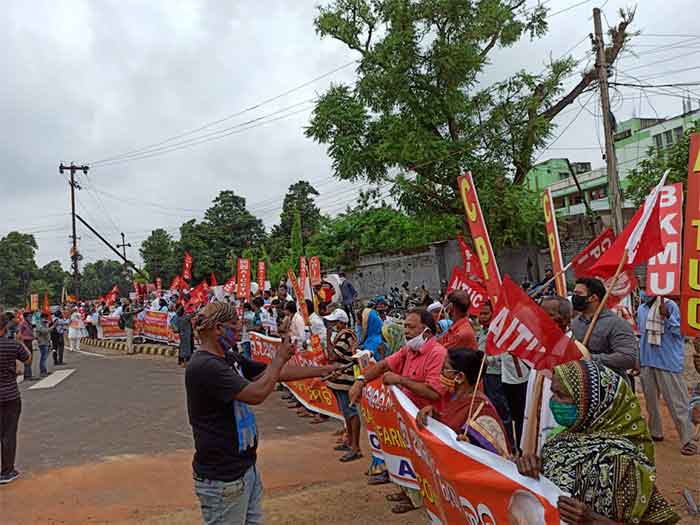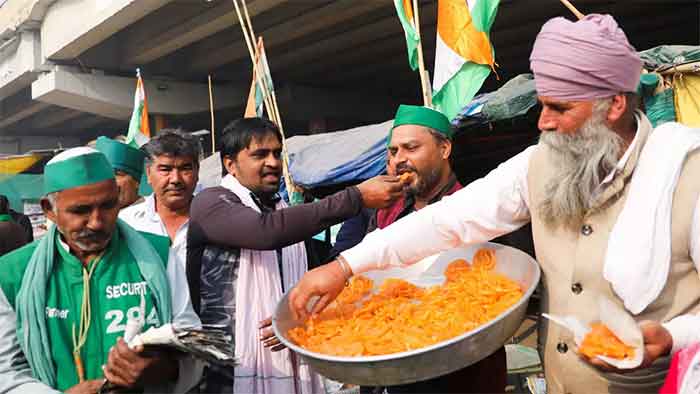
Amid aggressive protest by the members of the opposition, the Rajya Sabha passed three farm Bills on 20th Sept 2020 by voice vote which were earlier approved by the Lok Sabha. After the approval of the President of India all these three Bills have been the acts for implementation. Those who are not connected to farming argue that the introduction of these Acts are a watershed moment for Indian farmers. For decades, the farmers are bound by various constraints and bullied by middlemen. They argue that the Acts would liberate farmers from such adversities. However, the actual tillers of the land, the peasants are on the road opposing the farm reform 2020. They know that these reforms would allow the agricultural produced to be sold outside Agricultural Produce Marketing Committee (APMC) or market yards (Mondies). The government is assuring that market yards will work and Minimum Support Price (MSP) will be given. But the newly agrarian reform document is silent about such assurance. Peasants need the assurance in the law itself that the Swaminathan committee recommendation of 2005 (recommending cost price plus 50% profit as MSP) would be ensured. There is apprehension that big corporations would come for the trading of agricultural produce and would open their own private market yard without any assurance of MSP. In the initial stage, they will offer higher prices and peasants will come to the private market yard and the government agricultural produce marketing committee will be closed or remain un –operative. Once this happens the big traders and agri-business companies will dictate the terms in the agricultural produce market.
Moreover, there is the issue of the commission agents or middlemen asking for the lion’s share of the farmers’ income, leaving a pittance for the farmer. Now peasant can have a direct contract with the buyers and there is no intermediaries. However, this is not true. The big agro-business houses will have their paid employees act as a middle man to collect the farm produce from the peasants. The small and marginal peasants do not have retaining power of their produce. They need to sell their product immediately after the harvest is over. The company agents would take advantage of this to buy the product of the peasants at a lower price. The peasant may sell the product at the farm gate but there is no guarantee that they will get the minimum support price.
The Act regarding the contract farming is an agreement between either the agricultural produced traders, whole-sellers, big retailers or exporter or processor with the peasants where the peasant commits to sell a particular quality, particular quantity, at a particular time and at a particular price his product named in the agreement. As the name of the Act denotes it assures the peasants the price of its products and the firm services like finance, farm insurance, farm inputs and other technological assistance from the company it contracted with. However, farmers will be at pressure and they will not be able to determine the price of their product under contract farming. In India, 85% of the peasants are small or marginal peasants in the country and on the contract with them by big agro – producing company is an unequal agreement. There is a provision for the dispute redressal mechanism. But the big corporate house would take advantage of it in case of a dispute.
Moreover, contract farming would encourage capitalist farming and finish peasant agriculture in India. For each agricultural input, there is a market. There is a market for credit, for fertilizer and pesticide, for water, for seed, for land, for labour and also for machinery. All these markets are dominated by the merchants, bankers, insurance companies, traders commission agents, and rich peasant-cum- trader-cum-money lenders. They are extracting the surplus value produced by the peasant in agriculture. The amendment to the Essential Commodity Act has removed the foodstuffs and cereals from the essential commodity. Now, this has given an opportunity to the black marketers, profiteers to raise the price of essential commodities and create artificial scarcity. The government will have no control over the product, supply, distribution, and price of the essential commodities. It has been argued that this Act has taken care of the post-production activities and the supply chain. There will be much investment in the cold storage chain and other storage facilities.
There has been a shift of focus from the increase of agricultural production to that of the income of the peasant. Hence, post-production activities like harvesting, storage, transportation and marketing have been given importance. In other words, this is what is called monetization of the farm produce. Also, there is a change in the consumption pattern and dietary habits of the consumer and the government have addressed it by changing the strategy of agricultural growth from a farm–to- fork to focus on a demand-driven fork-to-farm approach. This broad shifting of agrarian strategy has led to the government to invest in post-production infrastructure such as cold storage –chains, warehouse facilities, processing units, transportation facilities. However, the government instead of investing in such agro –infrastructure asking the Multinational companies, agro-business houses and corporate houses to invest in the ventures. Thus, the government wants to eliminate public sector intervention and encourage private firms to make an exorbitant profit and the Modi government has ensured this in the new farm Act 2020 passed in the parliament. These Acts are systematic liquidation of small and medium-sized livelihoods. Through these reform measures, the agriculture will be heading towards large-scale capitalist production. It is an attempt to monopolize and industrialize agriculture by eliminating small and medium-sized farms. These policies are directed by WTO, IMF, and WB trio and the Modi government is co-ordinating this imperialist agrarian policy in India. This needs to be fought out through a protracted anti-imperialist class struggle.
This is written and published by Ganatantrik Adhikar Surakhya Sangathan, Odisha.
Write your comments to: The President of GASS email: [email protected]
SIGN UP FOR COUNTERCURRENTS DAILY NEWSLETTER













































